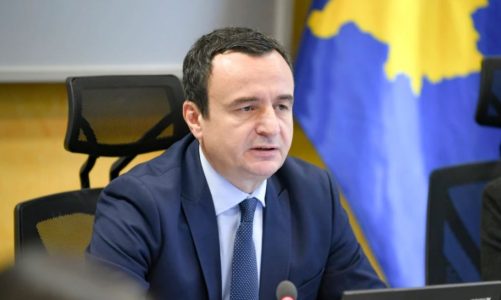
The signing of agreements, funds for energy reform in the region, but also clear messages are expected from the summit in Berlin.
"The turning point", the favorite phrase of German Chancellor Olaf Scholz, has also entered the jargon of the Berlin Process. Government circles from Berlin said on Tuesday that the "moment of truth" has already arrived for all Western Balkan countries and that they are expected "to learn from the new reality, created since the Russian invasion of Ukraine," said a senior official at the German chancellor on Tuesday in Berlin.
"There is no more room for conflicts"
Especially in the address of Kosovo and Serbia, clear messages are expected to be heard. Germany and France are currently putting diplomatic pressure on the two countries to agree to their proposal to normalize relations. "Today there is no place for such conflicts, with explosive potential, such as the one between Kosovo and Serbia", said the official.
According to him, these are the clear expectations of French President Emmanuel Macron and German Chancellor Olaf Scholz. "The status quo is unacceptable. It cannot continue like this so that the status turns into an 'apple of trouble' for every issue". According to him, this is also the reason why Germany and France have come up with a concrete plan for dialogue. According to the president of Serbia, Vučić, he foresees that Serbia, without having to recognize Kosovo's citizenship, will pave the way for Kosovo's membership in international institutions, especially the UN, and in return receive economic benefits and a faster membership in the EU.
The signing of the agreements is awaited
The unresolved status between Kosovo and Serbia is one of the stones hindering the progress of the Common Regional Market, which is the focus of the Berlin Process. Since the Berlin Process was initiated in 2014 by the then Chancellor of Germany, Angela Merkel, only the removal of roaming charges has been implemented. The four mobility agreements reached at the Sofia hybrid summit in November 2020 remained blocked due to disagreements between Serbia and Kosovo.
Therefore, the signing of three of them, which is expected to take place on November 3 in Berlin, is considered by Germany as an important success. The envoy of the German government in the Balkans, Manuel Sarrazin, and the Regional Cooperation Council, which is headed by the former Albanian minister of European integration, Majlinda Bregu, have held many negotiation sessions with the six countries of the Western Balkans to finally reach a language diplomatic acceptable to all parties. The three agreements enable the free movement of citizens only with identity cards, the mutual recognition of diplomas, and the recognition of professional qualifications.
Funds for energy
German Foreign Minister Annalena Baerbock called them "historic" last Thursday at the foreign ministers' conference in Berlin. For Germany, which has the Western Balkans in the focus of its policy, they are a hope to make substantial progress in other areas as well, such as in the security and energy sector.
According to sources near the German chancellery, the countries of the region have an urgent need to cope with energy supply bottlenecks. On Thursday, the President of the EU Commission, Ursula von der Leyen, is expected to promise aid to cope with the winter, but also grants for reforming the energy sector in the region. Here too, the prerequisite is that the countries are ready to cooperate with each other, the chancellery said. Last week, the energy ministers of the Berlin Process met in Berlin to discuss this issue.
The expert on the Western Balkans, Florian Bieber, tells DW that the agreements to be signed are an attempt to signal that the Berlin Process is more oriented towards concrete successes. But Bieber says the biggest challenge lies in bringing them to life. "There have been many memoranda and decisions over the past 8 years, but they have often been only partially implemented, because no one has checked their implementation. The respective host country has often set a new agenda and put an end to all previously made agreements," Bieber said./DW/
Information source @BalkanWeb: Read more at: www.botasot.al


